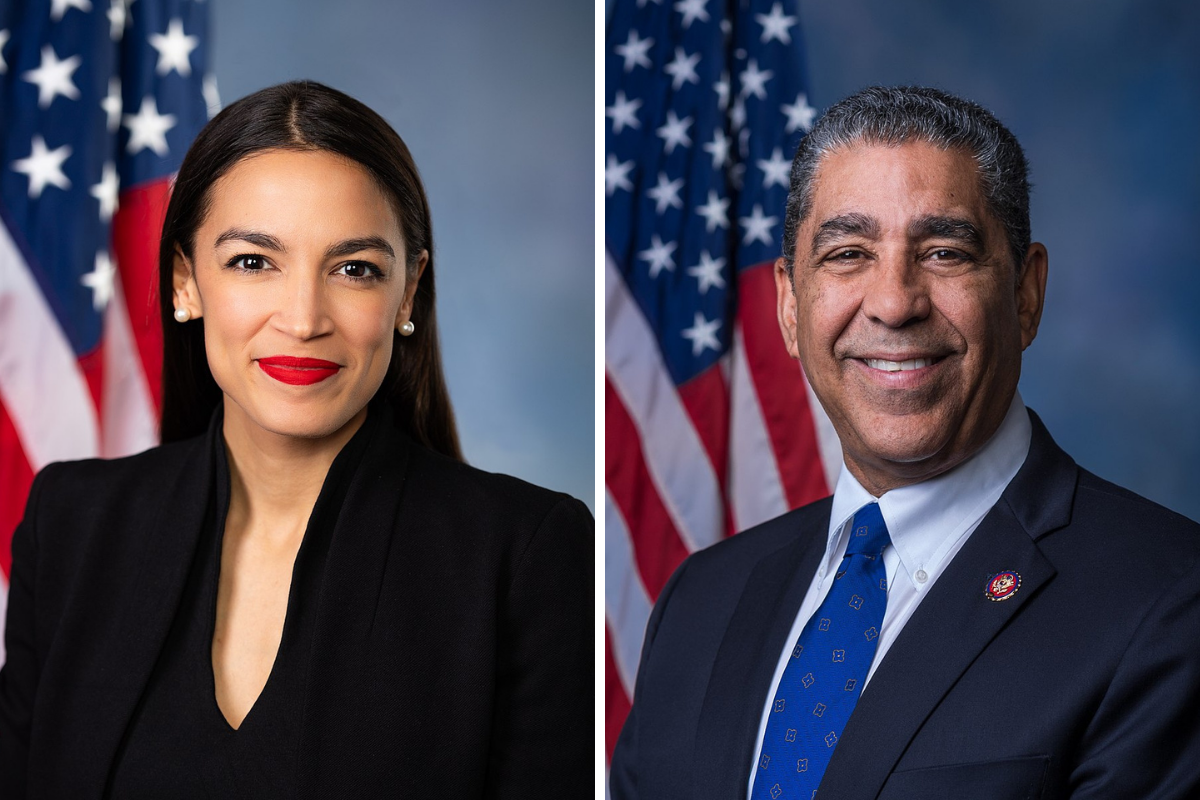

Rep. Alexandria Ocasio-Cortez (l), Rep. Adriano Espaillat (r) (Public Domain)
WASHINGTON, D.C. — House Speaker Nancy Pelosi cut the August recess short for members who returned to Capitol Hill on Monday evening to begin negotiations on the two-track legislative pathway forward for an infrastructure bill and a budget reconciliation agreement sent to the lower chamber by the Senate two weeks ago.
Within the budget reconciliation agreement, a pathway to citizenship —potentially for millions of undocumented immigrants living in the United States— hangs in the balance as the House takes up the measure. Over 20 Democratic Senators have told Latino Rebels that they support passing a pathway to citizenship through budget reconciliation, with Senator Tim Kaine citing a 2005 precedent in July for a budget reconciliation “that had a significant immigration component to it that included changing status.”
Rep. Alexandria Ocasio-Cortez (D-NY) tells Latino Rebels that she believes there are even more recent precedents for including permanent immigrant relief in the reconciliation negotiations.
“One of the ways that [a pathway to citizenship] can be included [in budget reconciliation] is in some of the essential worker and frontline worker provisions that we saw in our first reconciliation package with the American Rescue Plan,” Ocasio-Cortez told LR outside the House chamber after votes on Monday.
“What we are trying to do is cover as many people as possible,” Ocasio-Cortez continued, citing construction, childcare, education, and food service workers, as essential. “I believe that our immigrant population, because they are so overwhelmingly making up portions of our frontline and essential worker workforce, that’s where that throughline exists.”
Fellow New York Rep. Adriano Espaillat echoed Ocasio-Cortez’s sentiment on Monday, telling Latino Rebels that he considered food service workers who have been especially vulnerable during the pandemic as essential.
“I would consider a cashier in a supermarket who was exposed to maybe 75 people throughout the day in the pandemic to be essential. I’m telling you this because I literally went to the supermarket and said, ‘Wow, this young lady is essential, not only because I’m buying the food but because she’s potentially exposing herself to COVID,” Espaillat said.
According to Espaillat, the same can be true of food delivery workers who expose themselves to pandemic danger throughout their work shifts, especially when touching surfaces that could be infected with the coronavirus.
“Let’s say somebody delivers you your Chinese food,” Espaillat continued. “I literally did a count. I said, ‘Wait a minute, how many deliveries could a person like that do a day? Forty? Thirty? You have to go in the entrance to the building. That’s a doorknob. You have to ring the bell. That’s another contact. You have to open the elevator door. That’s a third contact. You have to knock on the apartment door. That’s a fourth contact. And then, you have to come back down and do it again, right? That’s eight contacts.”
Espaillat conceded that the “traditional thinking” among his colleagues in Congress is to narrow the essential workers category for immigration reform down to “just a few” undocumented immigrants who could qualify, but says that there is still work to be done.
“We haven’t figured out exactly what those job classifications are,” Espaillat said before ducking into the House chamber to vote on Monday afternoon.
Congress is back in session on Tuesday after a late night of negotiations between House leadership with moderates in the Democratic caucus over how to proceed with the two-track legislative agenda of infrastructure and budget reconciliation.
***
Pablo Manríquez is Latino Rebels’ Washington correspondent. He is an immigrant from Santiago de Chile with a political science degree from the University of Notre Dame. The Washington Post calls him “an Internet folk hero.” Twitter: @PabloReports.



also consider the housekeeping’s who worked in hospitals having direct contact with infected patients. How could we be left out??